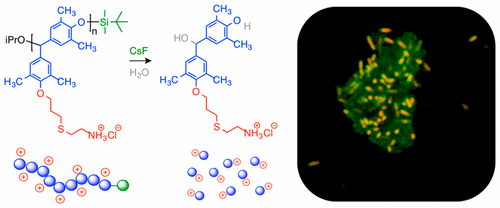当前位置:
X-MOL 学术
›
Biomacromolecules
›
论文详情
Our official English website, www.x-mol.net, welcomes your feedback! (Note: you will need to create a separate account there.)
Cationic Poly(benzyl ether)s as Self-Immolative Antimicrobial Polymers
Biomacromolecules ( IF 6.2 ) Pub Date : 2017-09-22 00:00:00 , DOI: 10.1021/acs.biomac.7b01062 Cansu Ergene 1 , Edmund F. Palermo 1
Biomacromolecules ( IF 6.2 ) Pub Date : 2017-09-22 00:00:00 , DOI: 10.1021/acs.biomac.7b01062 Cansu Ergene 1 , Edmund F. Palermo 1
Affiliation

|
Self-immolative polymers (SIMPs) are macromolecules that spontaneously undergo depolymerization into small molecules when triggered by specific external stimuli. We report here the first examples of antimicrobial SIMPs with potent, rapid, and broad-spectrum bactericidal activity. Their antibacterial and hemolytic activities were examined as a function of cationic functionality. Polymers bearing primary ammonium cationic groups showed more potent bactericidal activity against Escherichia coli, relative to tertiary and quaternary ammonium counterparts, whereas the quaternary ammonium polymers showed the lowest hemolytic toxicity. These antibacterial polycations undergo end-to-end depolymerization when triggered by an externally applied stimulus. Specifically, poly(benzyl ether)s end-capped with a silyl ether group and bearing pendant allyl side chains were converted to polycations by photoinitiated thiol–ene radical addition using cysteamine HCl. The intact polycations are stable in solution, but they spontaneously unzip into their component monomers upon exposure to fluoride ions, with excellent sensitivity and selectivity. Upon triggered depolymerization, the antibacterial potency was largely retained but the hemolytic toxicity was substantially reduced. Thus, we reveal the first example of a self-immolative antibacterial polymer platform that will enable antibacterial materials to spontaneously unzip into biologically active small molecules upon the introduction of a specifically designed stimulus.
中文翻译:

阳离子聚(苄基醚)作为自焚抗微生物聚合物
自焚聚合物(SIMP)是大分子,当受到特定的外部刺激时,会自发解聚成小分子。我们在此报告具有有效,快速和广谱杀菌活性的抗菌SIMP的第一个实例。根据阳离子功能对它们的抗菌和溶血活性进行了检查。带有伯铵阳离子基团的聚合物对大肠杆菌显示出更强的杀菌活性相对于叔铵和季铵对应物,而季铵聚合物显示出最低的溶血毒性。这些抗菌聚阳离子在受到外部刺激时会发生端到端的解聚。特别是,用半胱胺盐酸盐通过光引发的硫醇-烯基加成,将末端被甲硅烷基醚基团封端并带有烯丙基侧链侧基的聚(苄基醚)转化为聚阳离子。完整的聚阳离子在溶液中稳定,但是当暴露于氟离子时,它们会自发地解压缩到其组成单体中,具有出色的灵敏度和选择性。引发解聚反应后,大部分抗菌活性得以保留,但溶血毒性大大降低。因此,
更新日期:2017-09-23
中文翻译:

阳离子聚(苄基醚)作为自焚抗微生物聚合物
自焚聚合物(SIMP)是大分子,当受到特定的外部刺激时,会自发解聚成小分子。我们在此报告具有有效,快速和广谱杀菌活性的抗菌SIMP的第一个实例。根据阳离子功能对它们的抗菌和溶血活性进行了检查。带有伯铵阳离子基团的聚合物对大肠杆菌显示出更强的杀菌活性相对于叔铵和季铵对应物,而季铵聚合物显示出最低的溶血毒性。这些抗菌聚阳离子在受到外部刺激时会发生端到端的解聚。特别是,用半胱胺盐酸盐通过光引发的硫醇-烯基加成,将末端被甲硅烷基醚基团封端并带有烯丙基侧链侧基的聚(苄基醚)转化为聚阳离子。完整的聚阳离子在溶液中稳定,但是当暴露于氟离子时,它们会自发地解压缩到其组成单体中,具有出色的灵敏度和选择性。引发解聚反应后,大部分抗菌活性得以保留,但溶血毒性大大降低。因此,


























 京公网安备 11010802027423号
京公网安备 11010802027423号